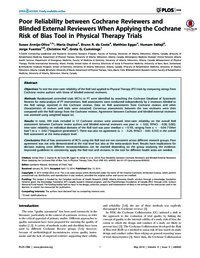Poor reliability between Cochrane reviewers and blinded external reviewers when applying the Cochrane risk of bias tool in physical therapy trials
Autor
Armijo-Olivo, Susan
Ospina, Maria
Da Costa, Bruno
Egger, Matthias
Saltaji, Humam
Fuentes-Contreras, Jorge
Ha, Christine
Cummings, Greta G.
Fecha
2014Resumen
Objectives: To test the inter-rater reliability of the RoB tool applied to Physical Therapy (PT) trials by comparing ratings from
Cochrane review authors with those of blinded external reviewers.
Methods: Randomized controlled trials (RCTs) in PT were identified by searching the Cochrane Database of Systematic
Reviews for meta-analysis of PT interventions. RoB assessments were conducted independently by 2 reviewers blinded to
the RoB ratings reported in the Cochrane reviews. Data on RoB assessments from Cochrane reviews and other
characteristics of reviews and trials were extracted. Consensus assessments between the two reviewers were then
compared with the RoB ratings from the Cochrane reviews. Agreement between Cochrane and blinded external reviewers
was assessed using weighted kappa (k).
Results: In total, 109 trials included in 17 Cochrane reviews were assessed. Inter-rater reliability on the overall RoB
assessment between Cochrane review authors and blinded external reviewers was poor (k = 0.02, 95%CI: 20.06, 0.06]).
Inter-rater reliability on individual domains of the RoB tool was poor (median k = 0.19), ranging from k = 20.04 (‘‘Other
bias’’) to k = 0.62 (‘‘Sequence generation’’). There was also no agreement (k = 20.29, 95%CI: 20.81, 0.35]) in the overall
RoB assessment at the meta-analysis level.
Conclusions: Risk of bias assessments of RCTs using the RoB tool are not consistent across different research groups. Poor
agreement was not only demonstrated at the trial level but also at the meta-analysis level. Results have implications for
decision making since different recommendations can be reached depending on the group analyzing the evidence.
Improved guidelines to consistently apply the RoB tool and revisions to the tool for different health areas are needed.
Fuente
PLoS ONE, 9(5), e96920Identificador DOI
doi.org/10.1371/journal.pone.0096920Colecciones
La publicación tiene asociados los siguientes ficheros de licencia:


